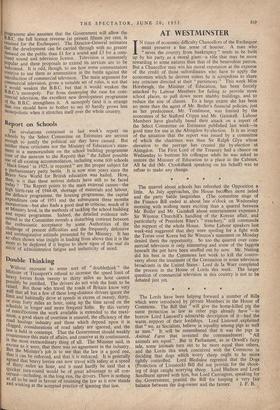Report on Schools
The revelations contained in last week's report on schools by the Select Committee on Estimates are serious enough to justify the political stir they have caused. But neither these criticisms nor the Ministry of Education's state- ment in a memorandum on the school building programme 'One of the annexes to the Report) that " the fullest possible use of all existing accommodation, including some 600 schools black-listed ' in 1925, is required " are the 'proper subject for a Parliamentary party battle. It is now nine years since the Brave New World for British education was hailed. How, 4then, is it that these serious defects have still to be faced today ? The Report points to the main external causes—the high birth-rate of 1944-48, shortage of materials and labour, the defence programme, the housing programme, the capital expenditure cuts of 1951 and the subsequent three months moratorium--but also finds a good deal to criticise, much of it at Ministry level, in the methods of tackling the school building and repair programme. Indeed, the detailed evidence sub- mitted to the Committee reveals a disturbing contrast between the enthusiastic acceptance by some Authorities of the challenge of present difficulties and the frequently defensive and unimaginative attitude presented by the Ministry. It has so often shown wise insight in leading from above that it is the more to be deplored if it begins to show signs of the mal du Siècle of administrative fatigue and inelasticity of mind.


































 Previous page
Previous page